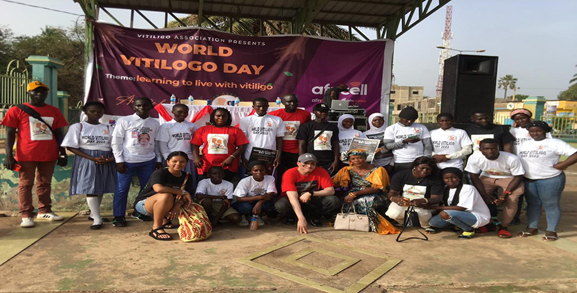By: Dawda Baldeh
In commemorating World Vitiligo Day, the Vitiligo Association in The Gambia has observed the day by raising awareness on vitiligo. They said they are being traumatized and judged negatively by society.
Vitiligo is a long-term condition where pale white patches develop on the skin. It’s caused by the lack of melanin, which is the pigment in skin. Vitiligo can affect any area of skin, but it commonly happens on the face, neck and hands, and in skin creases.
The day is celebrated on 25th June each year; however, this is the first time Gambia joined the world to celebrate the day.
The day was established to raise global awareness for vitiligo, a disfiguring autoimmune disease that causes white spots on the skin. Michael Jackson one of the famous American singers, who died in 2009, was also remembered as a person who suffered from vitiligo.
Buba Jammeh, a Vitiligo person who is also the association’s head, explained the importance of the day. “The day is a global awareness campaign to tell people about vitiligo and also to remember people who died from vitiligo,” he said.
Jammeh said he was not born with vitiligo.
“I had vitiligo in 2009. At the time, I was very scared and confused because I didn’t know what it was. I underwent several medical tests and treatments but later I was told it was vitiligo.
“I come back in The Gambia to celebrate the day with the people who are undergoing the same challenges. Vitiligo is not a disease as people think. It is just a skin disorder caused by lack of melamine. Vitiligo is not painful, and it cannot be transferred from one person to another. However, we are being judged negatively by society, so we are traumatized. It is not our fault to have vitiligo. I was not born as a vitiligo, but I later developed it when I was already a grown man,” he narrated.
He highlighted challenges he faced when trying to cured the skin disorder.
“I underwent several traditional and medical treatments, but I later realized that vitiligo cannot be cured. A local marabout gave me some herbs that nearly killed me when he knew he could not cure me but because of the money he still promised to cure the skin disorder. This is one of our major problems. You cannot cure us and please don’t kill us,” he emphasized.
“For my case, I thank my family and friends for the support and encouragement they gave me. I went to UK because it was not easy for me to stay here.”
He said the association’s objective is to ensure vitiligo persons are freed from stigmatization and so that they can live like any other person.
Mr Jammeh, reiterated that vitiligo is a disorder that cannot be cured traditionally, warning traditional medicine dealers to avoid giving them treatments that can lead to other health implications.
Mr. Lamin Sambou, representative from the Ministry of Health, urged people to avoid traumatizing and stigmatizing people with vitiligo, noting that they need support and encouragement.
“We have to support vitiligo persons. We should not judge them. It can happen to anyone irrespective of age,” he added.
Vitiligo Gambia is leading efforts in addressing challenges of persons living with vitiligo in the country.




